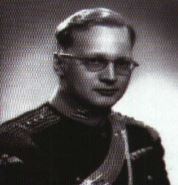John Melhuish was born in 1921 and educated at Sherborne. In 1940 when he left school, he decided not to take up a place at Oxford University, but to join the Army. After a course at the RAC OCTU, he was commissioned in June 1941.

Having spent the next 18 months in the UK he embarked for the Middle East at the end of 1942, joining the 3rd Hussars in Lebanon where he spent the next year before the Regiment went to Italy at the beginning of 1944 where it operated for the next year.
At the beginning of 1945 the Regiment returned to Syria, and after a brief period moved to Palestine to join 6th Airborne Division as the Airborne Armoured Reconnaissance Regiment.
From then, until the end of the Mandate in the middle of 1948 the Regiment was heavily involved in anti-terrorism duties and in addition to becoming the Adjutant, John received a Mention in Dispatches for distinguished service.
In 1950 he attended the Staff College Course and thereafter took up the first of what were to be a number of intelligence-related appointments. This was followed by a period on the staff of Northern Army Group before returning to 3H as a Squadron Leader.
In 1958 he moved to Aden as the GSO 11 Internal Security. In this role, he was effectively the second in command of internal security for the colony. When he left to return to the UK he received a letter of thanks from the chief of police who said that he was in no doubt that the improvements in internal security during the time that John was in Aden were chiefly due to his efforts.
On his return to the UK in 1961, he was appointed to the Joint Intelligence Committee, which was part of the Cabinet Office where one of his main duties was to provide the Prime Minister, Harold MacMillan, with regular briefings on the deteriorating situation which eventually led to the Vietnam War.
Two years later he left the Army and joined the Department of Education and Science, ultimately achieving the position of Assistant Secretary. For much of his time in the Civil Service he was involved in various aspects of higher education and which necessitated his participation in various overseas meetings organised by UNESCO and the Council of Europe.
He was on one occasion appointed plenipotentiary and representative for the UK in order that he could sign the agreement in Paris on behalf of the Government on aspects of higher education in the European Union. When he transferred to another appointment within the Department, the Director of Education and Cultural and Scientific Affairs in Strasbourg wrote a glowing testament to John’s Permanent Secretary.
Both before and after retirement he was a Governor of the King’s School, Rochester, and for 12 of the 21 years, he was Chairman of the finance and General Purposes Committee.
He was a Cathedral Steward for nearly 40 years and Chairman of the Friends of the Cathedral for three. He served on the Diocesan Synod for many years and was a member of both its Diocesan Board of Finance and its Stipends Committee. In 1963 he became the Patron of Ashwater Church in Devon, an appointment previously held by his father.


